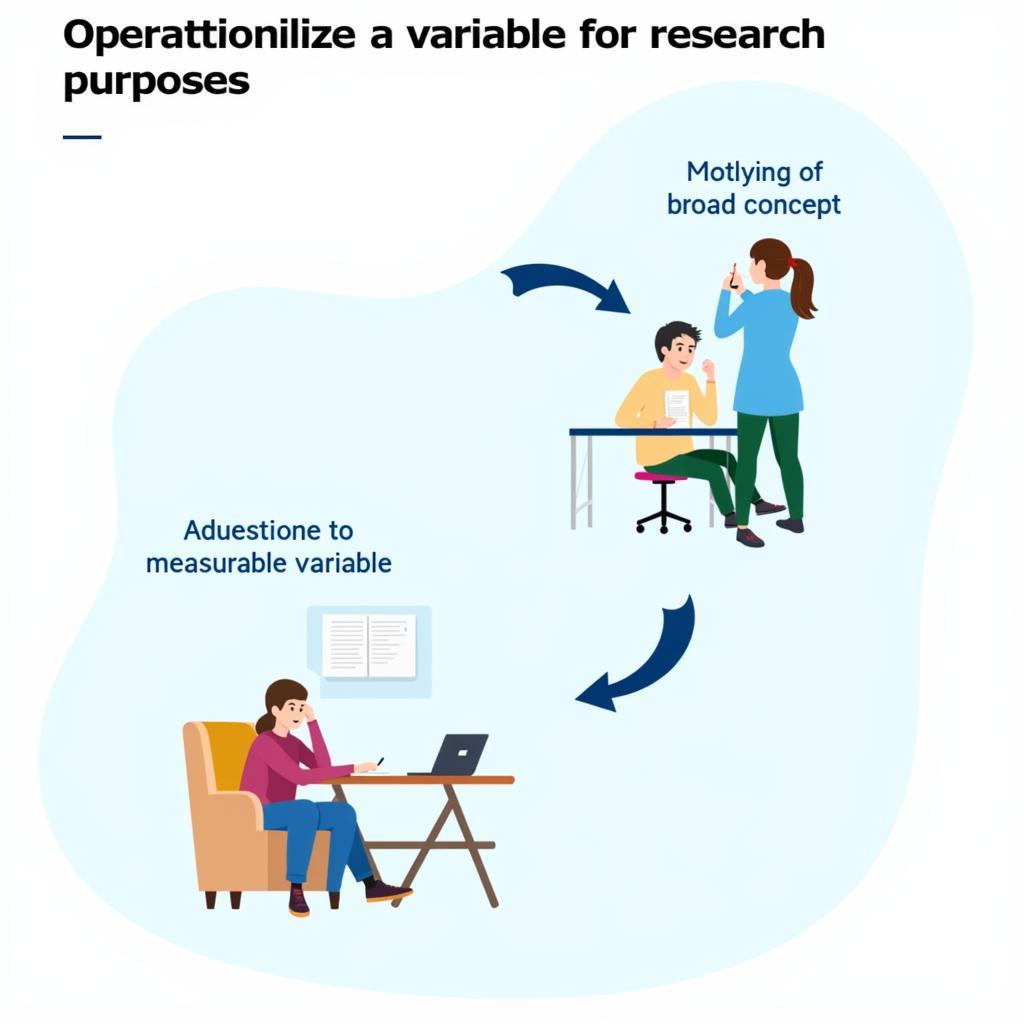Understanding operational definitions is crucial in research, especially when dealing with abstract concepts. In essence, an operational definition takes a broad concept and transforms it into a measurable or observable variable. This process is crucial for ensuring clarity and replicability in research.
 Operational Definition in Research
Operational Definition in Research
Why are Operational Definitions Important?
Let’s imagine you’re conducting research on the effects of meditation on stress levels. The terms “meditation” and “stress” can be interpreted in various ways. An operational definition provides a clear framework for what constitutes “meditation” (e.g., practicing mindfulness techniques for 20 minutes daily) and how “stress” is measured (e.g., cortisol levels, self-reported anxiety scores).
This specificity ensures everyone is on the same page, making your research more reliable and easier for others to replicate or build upon. It also helps in avoiding ambiguity and misinterpretations, leading to more accurate and meaningful results.
Breaking Down the Elements of an Operational Definition
Crafting an effective operational definition involves:
- Identifying the Concept: Start with the broad concept you want to investigate. For instance, “intelligence” or “customer satisfaction.”
- Defining Measurable Indicators: Determine what specific behaviors, characteristics, or indicators can represent the concept in a measurable way.
- Developing a Clear and Concise Definition: Formulate a statement that explicitly outlines how the concept will be measured or observed in your study.
For example:
- Concept: Job Satisfaction
- Operational Definition: Measured using a five-point Likert scale survey assessing employees’ agreement with statements about their job satisfaction (e.g., “I am satisfied with my current job responsibilities”).
Examples of Operational Definitions in Different Fields
Operational definitions are employed across various research fields. Here are some examples:
- Psychology: In a study on aggression, researchers might define it operationally as the number of times a child hits a doll during a play session.
- Marketing: A study exploring brand loyalty could define it operationally as the frequency of purchases from a specific brand within a given time frame.
- Education: When studying student engagement, researchers might define it operationally as the number of times a student actively participates in class discussions or asks questions.
Common Mistakes to Avoid
 Common Mistakes When Creating Operational Definitions
Common Mistakes When Creating Operational Definitions
While seemingly straightforward, creating a robust operational definition requires careful consideration. Avoid these common pitfalls:
- Vagueness: Using overly general terms that lack specific measurable indicators.
- Circular Logic: Defining a concept using the concept itself.
- Lack of Justification: Not providing a clear rationale for why a particular operational definition was chosen.
Conclusion
Operational definitions are the backbone of sound research methodology. They bridge the gap between abstract concepts and measurable data, ensuring clarity, replicability, and accurate interpretations of research findings. By carefully crafting and justifying your operational definitions, you contribute to the robustness and reliability of your research.
FAQ
1. What is the difference between a conceptual definition and an operational definition?
A conceptual definition explains a concept in general terms, often drawing from theories or existing knowledge. An operational definition, on the other hand, specifies how that concept will be measured or observed in a particular study.
2. Can I use multiple operational definitions for the same concept in one study?
Yes, using multiple operational definitions can provide a more comprehensive understanding of a concept. However, it’s essential to ensure that all definitions are clearly stated and justified.
3. Are operational definitions set in stone?
While it’s generally not advisable to change operational definitions during a study, they can be refined or adapted for future research based on the findings and limitations of the initial study.
Need further assistance with your research? Contact us at Phone Number: 0904826292, Email: research@gmail.com or visit our office at No. 31, Alley 142/7, P. Phú Viên, Bồ Đề, Long Biên, Hà Nội, Việt Nam. We have a 24/7 customer support team ready to help!